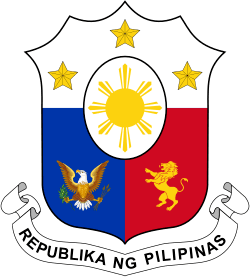Katarungan
| Katarungan | ||
|---|---|---|
| Barangay | ||
| ||
| Coordinates: 10°02′51″N 124°29′19″E / 10.0475°N 124.4886°ECoordinates: 10°02′51″N 124°29′19″E / 10.0475°N 124.4886°E | ||
| Country | Philippines | |
| Region | Central Visayas Region VII | |
| Province | Bohol | |
| District | 2nd District of Bohol | |
| Municipality | Ubay | |
| Urban District | V | |
| Purok | 7 | |
| Government | ||
| • Type | Sangguniang Barangay | |
| • Brgy Captain | Abundio Mesiona | |
| • Brgy Council | ||
| Area | ||
| • Total | 409 ha (1,011 acres) | |
| Population (2015 census)[1] | ||
| • Total | 1,680 | |
| • Density | 410/km2 (1,100/sq mi) | |
| • Voter (2013)[2] | 898 | |
| Time zone | PST (UTC+8) | |
| ZIP code | 6315 | |
| IDD : area code | +63 (0)38 | |
| PSGC | 071246016 | |
Katarungan is one of the 44 barangays of the municipality of Ubay, in the province of Bohol, Philippines.
The barangay's total land area is 409 hectares (1,010 acres).[3] According to the 2015 census, it has a population of 1,680.[1] In the 2013 electoral roll, it had 898 registered voters, meaning that 53% of the population are aged 18 and over.[2]
Katarungan celebrates its annual fiesta on 30 May in honor of their patron saint.
Location
Located in the west central part of the municipality, Katarungan overlooks Camotes Sea to the north. To the east it is bounded by Tipolo, to the south by Bood and to the west by Fatima. It is 2.5 km (1.6 mi) from the town center, Poblacion.
History
The place name comes from the Tagalog word katarungan which means justice or equity.
Government
There are seven puroks overseen by the elected kagawads.
Facilities and Services
- Barangay Chapel
- Barangay Hall
- Barangay Health Center
- Basketball Court
- Day Care Center
- Elementary School
- Multi-purpose Pavement
- 7 Purok Kiosks
References
- 1 2 Census of Population (2015). "Region VII (Central Visayas)". Total Population by Province, City, Municipality and Barangay. PSA. Retrieved 20 June 2016.
- 1 2 Project of Precincts for the 2013 Barangay Elections
- ↑ Saz, Efren B. (April 2007). "A Comprehensive Assessment of the Agricultural Extension System in the Philippines: Case Study of LGU Extension in Ubay, Bohol" (PDF). Philippine Institute for Development Studies. Retrieved March 14, 2015.



